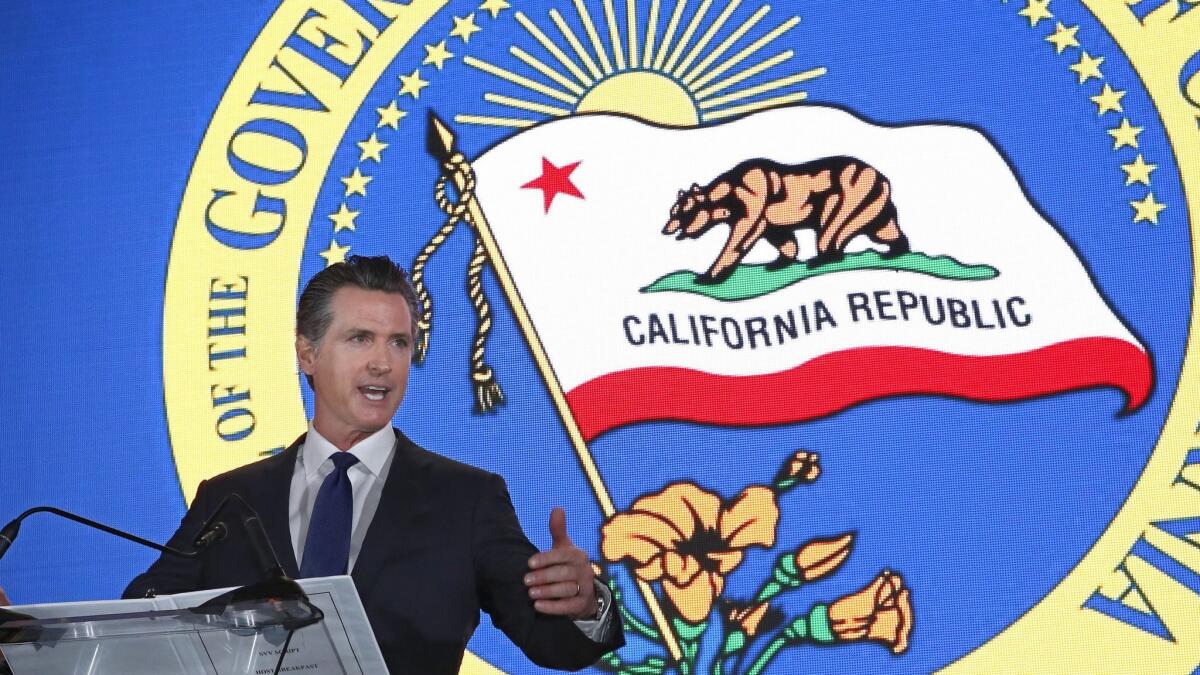Gov. Gavin Newsom abandons water tax, rejects some new spending in California budget deal

- Share via
Reporting from Sacramento — Gov. Gavin Newsom and Democratic legislative leaders announced Sunday the broad outlines of a new state budget, one that provides a boost for California’s low-income adults and children but excludes a controversial tax to pay for clean water in distressed communities.
The details of key parts of the agreement were unveiled during a late afternoon hearing in which legislators from both houses met to approve the proposal. Though it does not signal the end of the budget process — legislators cited numerous places where the plan includes placeholder language, thus leaving the details to be determined later — the action brought to an end principal budget negotiations at the state Capitol, the first for Newsom since taking office this year.
“The budget adopted by the Conference Committee is balanced, creates historic reserves and expands budget resiliency,” Newsom said in a written statement.
Lawmakers are expected to vote on the parts of the spending plan later this week in time to meet their constitutional deadline of June 15.
“In every budget, there’s ‘good’ and ‘could be better,’” said state Sen. Holly Mitchell (D-Los Angeles), chair of the budget conference committee. “But I think it’s a good budget.”
For the deal to come together, Newsom had to abandon his proposed $140-million tax on residential, commercial and agricultural water users — money he said was needed for helping communities without a reliable source of clean drinking water. Democrats in the Senate were among the tax’s most vocal opponents, many keenly aware of growing criticism that water bills would be going up even though the state expects a multibillion-dollar revenue windfall in the coming months.
Instead, lawmakers will spend $133.4 million on clean water projects, with the lion’s share of the cash coming from proceeds raised by the sale of greenhouse gas emission credits — the centerpiece of California’s cap-and-trade program. The proposal envisions drinking water programs will continue to be funded from the climate change program, thus avoiding an additional burden on the state’s general fund.
But Democrats in both the Senate and Assembly also made a key concession, dropping their demand that Newsom agree to provide healthcare to all California residents, regardless of immigration status. The governor’s proposal, an expansion of the program that was ultimately accepted, will allow those in the U.S. illegally full access to Medi-Cal services up to age 25, as long as they meet financial eligibility requirements. Legislators had wanted to include older immigrants too, a proposal that carried a substantially larger price tag.
Immigrant rights advocates were disappointed in lawmakers’ opting for the less expensive option that focuses on younger adults. “The exclusion of undocumented elders from the same healthcare their U.S. citizen neighbors are eligible for means beloved community members will suffer and die from treatable conditions,” said Cynthia Buiza of the California Immigrant Policy Center.
Left unresolved Sunday was whether legislators will accept Newsom’s $1.7-billion plan to align state tax law with federal tax changes enacted by the Trump administration in 2017. The money from making those changes — including limits on losses claimed by some businesses and other deductions — would be used to pay for a threefold increase in California’s earned income tax credit, a cash payment available to low-income citizens.
Newsom faces a big political test as he shapes his first California budget »
Lawmakers insisted they would continue to negotiate on the issue — which three Capitol sources, all of whom requested to speak on background, said would require reluctant Democratic members of the state Assembly to sign on. Because it would result in a tax increase for some Californians, the proposal would require a supermajority vote in both houses. The budget agreement, however, already assumes that tax revision will happen, and its failure could unravel key parts of the broader deal.
Legislators also agreed to Newsom’s two-year sales tax exemption for the purchase of diapers and menstrual products, even though Democratic lawmakers had criticized the effort as too temporary to make a significant difference to low-income families. Democrats in the Assembly had wanted the products to be tax-free for a decade but dropped their request in recent negotiations.
Elsewhere, the budget framework would offer additional dollars toward early childhood education — similar in size to that proposed by Newsom in his original spending plan. Democratic legislators had originally sought an additional $200 million for more subsidized child-care slots and for additional staffing.
And there was consensus on providing more than $1 billion in new resources to tackle the state’s homelessness crisis, most of it in the form of new grants to local governments and regional homelessness agencies for services such as emergency shelters, rental assistance and permanent housing construction. But it was unclear whether additional flexibility would be given on how to spend those dollars, a demand made by several local community groups in recent days.
Public schools remain one of the state’s biggest spending items, slated to receive almost $102 billion in spending in the new fiscal year. And lawmakers agreed to Newsom’s plan to stash away $389 million in a special “rainy day” reserve fund for schools — far more than Democratic legislators had wanted to set aside.
Lawmakers are unlikely to vote on the full package of budget-related bills this week, instead sending the main documents to Newsom’s desk and then returning to negotiations before the end of the fiscal year June 30.
Follow @johnmyers on Twitter and sign up for our daily Essential Politics newsletter
More to Read
Get the L.A. Times Politics newsletter
Deeply reported insights into legislation, politics and policy from Sacramento, Washington and beyond. In your inbox twice per week.
You may occasionally receive promotional content from the Los Angeles Times.











